WTO Interviews: Voices from Around the Planet
by John Tarleton
December 1999
Table of Contents
SEATTLE—Scholars, activists and concerned citizens from all over the world converged on Seattle during the week of the WTO ministerial conference. They weren't invited by the trade ministers. But, they came anyway.
When people weren't marching in the streets or holding vigils or being tear-gassed by the police, they were attending (or conducting) forums and teach-ins that covered every conceivable aspect of corporate globalization. It was a feast. For one week, Seattle was the most fascinating place to be on the planet.
Susan George: French Scholar-Activist
Susan George is a keen observer of transnational corporations. Born and educated in the US, she has lived in France for the past 30 years. She writes for the Transnational Institute and is the author of How the Other Half Dies, A Fate Worse Than Debt, Faith and Credit: The World Bank's Secular Empire and Debt Boomerang: How Third World Debt Harms Us All.
 Speaking on November 26 at the International Forum on Globalization teach-in at Benaroya Hall in downtown Seattle, she offered a scathing, unsparing analysis of the World Trade Organization (WTO) and corporate globalization. Where the powerful once tried to conquer the world with tanks and armies, they now use trade agreements and secretive organizations like the WTO to ensure control of markets and resources, she says. We met the following afternoon and she elaborated some more on what the WTO means at this moment in history.
Speaking on November 26 at the International Forum on Globalization teach-in at Benaroya Hall in downtown Seattle, she offered a scathing, unsparing analysis of the World Trade Organization (WTO) and corporate globalization. Where the powerful once tried to conquer the world with tanks and armies, they now use trade agreements and secretive organizations like the WTO to ensure control of markets and resources, she says. We met the following afternoon and she elaborated some more on what the WTO means at this moment in history.
“There's a Genuine War Going On.”
JT: Could you talk a little bit more about the metaphor you used last night for the WTO as an army seeking to conquer all the world's resources for a few corporations.
SG: I didn't use it as a metaphor. I think there's a genuine war going on. And I think that war is basically between the people and the corporate structures, whether they be industrial or financial.
These structures have to have rules in various areas because they want a predictable environment and they are imposing these rules so that they will be most useful for their purposes. So, this is a system of, by and for the corporations.
And if you think I'm exaggerating, what I tried also to do last night was mention some of the coalitions of corporations that are right in there with the delegates and that are inviting the various negotiators to talk with them beforehand and are giving them detailed recommendations.
We've got our coalitions in Europe and you've got your coalitions here in the United States. And they get together in various things like Davos. They get together in the Trans Atlantic Business Dialogue (TABD) and though there are contradictions between some sectors, those guys basically know what they want.
The IMF is one part of their rules system. The World Bank is another. And, the WTO is also a part of their rules system. And, they were madder than hell when they lost on the Multilateral Accord on Investment (MAI) because that was to be another leg of the stool.
We really are in a war. And if you're in a war, you've got to seek allies. You've got to know what you're up against in terms of propaganda, who the enemy really is, what the instruments that the enemy is using are. You've also got to decide that you're not going to be a single-issue outfit. Because if you are, you'll be lost. If you don't stick together with other people and with other interests, then each one of us will be shot down.
“History Doesn't Repass the Dishes”
JT: You state that what's going on in The Battle of Seattle this week is for global civil society what Lexington and Concord was for this country.
SG: Yes. There have been decisive battles in history. There are times when history does present you with a particular crucial moment. And, I think this is one of them. It's handing us on a platter things we can really do if we stick together.
There's a saying in France that history doesn't repass the dishes. It doesn't pass the chicken gumbo twice. You've only got once to serve yourself. And if you don't do it then you lose.
Sticking Together
So, my message really was that small farmers and family farms are deeply in danger. But if they only fight for the family farm, they are going to lose. The environment is in a deep state of destruction. But if ecologists only fight for the environment, the environment is going to go down the drain and so on and so on.
We've really got to be fighting for each other because the structure and the rules of the WTO are so complex that they can forge ahead and get what they want through different bits of the WTO. We have got a war on. They have declared it against us. The one thing I didn't say was that they are starting to try and disqualify us.
JT: How so?
SG: This is very clear in the media. Peter Sutherland, who used to be the chair of the WTO, was saying in The Financial Times the other day ago that we are ignorant. The other line is we don't represent anybody, that we're just self-appointed troublemakers. In Europe, they always tell us that we're anti-American.
Then, the other argument is that you want to take us back to the '30s and have a system which is totally anarchic and that brought war and thus making us responsible for the Second World War.
Well, the answer to that is all systems have to have rules. Even the Mafia has to have rules. The point is, who is making those rules? And, on whose behalf are they making them? The problem isn't the environment, or hormone beef or bananas. It's the WTO. That's the thing to focus on.
Creating International Democracy
JT: This is a process. For the last 200 years since the French Revolution, there's been an idea that ordinary people are citizens and agents of their own actions. And, that is being turned on its head.
SG: This is something where we've got a pretty good coalition in France. We've got over 65 organizations at last count. We were the ones who pushed our government to withdraw from MAI and that helped to bring down the rest of it.
I think the real question is how to establish citizenship at the international level and how to create international democracy. And we're really just at the beginning of that.
We don't know how we're going to create citizenship at a global level. We don't have a blueprint and let's not worry about this. Let's try to move ahead. Let's try to do it transnationally because the enemy is transnational.
And, we've got to transcend all this business of race and class and gender and minorities. I find this very distressing in this country.
Identity Politics
JT: The rise of identity politics.....
SG: Very much so. I think this has been the biggest gift to the opposition that has ever been made. And, I don't always make myself very popular saying that.
But in France, where I've lived two-thirds of my life, I'm very much influenced by the concept of citizenship. We really believe that in a republic everybody has the same rights and we fight to improve those rights together. But a system based on grievances, I think we've got to go beyond that. Because if we don't, then once again it's divide and rule. And that's the oldest strategy in the world.
Should the WTO Be Reformed or Abolished?
JT: Do you favor reforming the WTO? Or, would you like to see it abolished? There seems to be a division in the discussion this week.
SG: I think that's a false division. If you look at the principles at the base of the WTO: the refusal of the precautionary principle, the refusal of the polluter pays, the refusal to recognize the difference between a product made by exploited children and a product made under decent labor conditions, not being able to distinguish between products that were harvested in a renewable way. Those things are right at the bottom of the WTO. So whether you change the principles and still call it the WTO or whether you say that it's impossible to organize a world system along those lines, I think it's a false debate.
“This Is a Very Hopeful Moment in History”
JT: Last question. Any guess on what will become of the WTO in the next 5, 10 or 20 years?
SG: I think this is a very hopeful moment in history. I've been engaged in progressive politics for a little more than 30 years and I think this is one of the best moments I've ever seen.
The real trough was in the '80s and the early '90s. And now, look at all the young people. There were years where I would give talks and there wouldn't be any young people there. Now, people are realizing that globalization has not done anything for them and by God it isn't going to.
80% of the people in the world are being harmed by globalization. There's a very tiny percentage that is profiting. And, a small group of people is not affected one way or the other. That makes a lot of people being harmed by globalization. And they're catching on. People aren't stupid.
Hassan Adebayo Sunmonu: Organization of African Trade Union Unity
Africa, the world's poorest continent, is also the most desperately in need of trade and development. But, does it need the WTO?
JT: Hassan, can you talk a little bit about the impact of the WTO and international trade at this point in your country and around Africa? And, what you are looking for in negotiations this week.

HAS: Well, the impacts as far as my country, Nigeria, and my continent, Africa, have been mostly negative.
Take one or two examples. For instance, developed countries like the US and Europe are still subsidizing agriculture. And, our governments are forbidden from subsidizing agriculture. In what way can any country be self-sufficient if our country can't subsidize it?
Number two, when you are negotiating from your own level of development, you must also take into consideration the lower level of development of the other members of the WTO. Those who are backward should be able to catch up faster because they don't have to re-invent the wheel. They should be able to catch up in time to make a level playing field. So far, it is not.
And, that's why the impact of the WTO on our economies, on our lives has been negative in Nigeria and Africa.
“To Serve People Not Capital”
JT: Do you think the developed countries will listen to the poorer countries? Or, will they just say the logic of power is behind them?
If they don't listen, you and I, as a part of the civil society organizations of our countries will compel them to listen.
JT: What is your position on reform vs. just getting rid of the WTO?
HAS: We want it reformed. We don't want it dead. We want it reformed to serve people not capital.
Terry Luding: Locked-Out Steelworker, Spokane
Terry Luding, 46, is a steelworker with 23 years experience. He lives in Spokane, Washington. He is married with three children. Luding's father worked 23 years at the same steel mill.
JT: Talk about how the new corporate economy has affected you personally and your fellow co-workers in Spokane.

TL:Right now, I've been out of work for 14 months and the main reason is corporate greed. The company was making money but they want more money. They locked us out of our jobs illegally. They brought in scabs from all over the country. They'll work our jobs. They're paying them pretty good money to keep them there. They (Kaiser) are losing money. At the same time, we were making them money. It wasn't enough for them. They want more. So, they're trying to break the union. And by doing that, keeping us out of work.
They've lost $132,000,000 in a year. That's stuff they've come out with that they actually have to report. We know it's a lot more than that. The plants aren't running safe. Injuries are up 300%. They've had a number of fines for polluting the environment. All of these are from unskilled labor. They're putting in people to do jobs that we've trained for years to do.
We took cuts back in the '80s to save this company from bankruptcy with the guarantees that when things got better we would get them back. But, we've never seen them. They keep wanting to take more and more. It's corporate greed.
Chainsaw Charlie
JT: And the new owner, Charles Hurwitz, seems to have a shady reputation.
TL: Chainsaw Charlie. He owns Maxxum Corporation and that's the parent company. He also owns Pacific Lumber. A problem we have with Pacific Lumber is that he laid off workers from the mills down there and he told them if they wanted a job they can come up and scab in the aluminum plants in Washington. We have an unfair labor practice against that.
JT: What's the connection you see between what's happening to you in Spokane and this ministerial trade meeting here in Seattle for the WTO?
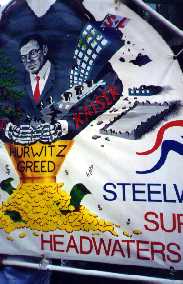 (picture of Hurwitz banner)
(picture of Hurwitz banner)
TL: People need to wake up. I just found out about it (the WTO) six months ago. And the more I find out about it, the madder I get.The people have the right to know this stuff. It's going to be in closed meetings. We need to have our say in what's going on.
JT: Are you surprised that you're going to be marching side-by-side with environmentalists wearing turtle costumes?
TL: No, not really. I've been down in California in the Redwoods. We've joined forces with them down there. We're getting used to being together.
Jaeok Lee: South Korean Small Farmers Movement
The Clinton Administration came to Seattle looking to "liberalize" trade in agricultural products. Countries that currently protect small farmers would have to make way for the juggernaut of corporate agribusiness. According to Jaeok Lee of South Korea, as many as half of his nation's 5,000,000 small farmers would be wiped out if all trade barriers were immediately eliminated.

Where would these farmers and their families go? What would happen to the rural culture that has been an integral part of Korean life for centuries? Is it a good thing for South Korea to depend on others to grow its rice?
Thirty South Korean NGOs (Non-Governmental Organizations) came to Seattle to raise these questions. Barred like most other grassroots citizens groups from participating in WTO activities, they took their protests into the streets.
JT: Why have you come all the way to Seattle to protest this conference of the World Trade Organization?
JL: In the next round of agricultural trade negotiations, we are afraid the interests of the exporting country will only be reflected. We want to reflect our importing nations interests in the next round of negotiations.
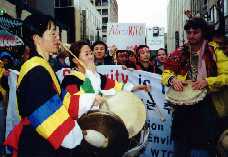
JT: What's the situation of Korean small farmers and how is globalization impacting them?
JL: 90% of Korean farming consists of small-scale farmers. They cannot compete with the large-scale farmers in the exporting countries if our market is liberalized.
JT: What is your government telling you? Do they support the small farmers? Or, do they support liberalization?
JL: The position of our government is very similar to our NGOs' position.
JT: So, they are resisting liberalization?
JL: Yes.
JT: Can you tell the people in the US a little bit about how your groups are able to be effective enough to keep the WTO and globalization from destroying your local interest.
JL: We do not completely oppose the liberalization of the market. We just stress that the market liberalization must be in a gradual manner. If our market is suddenly liberalized, our farmers will be destroyed.
Martin Shaw: English Eco-Rebel With a Cause
The ascendency of genetically modified (GM) foods seemed a certainty until this past spring. Businesses like Monsanto had invested billions of dollars into reinventing themselves as "life sciences" corporations. Wall Street was sure it would pay off. Then, a funny thing happened over in Europe.
Environmentalists and consumers, especially in the UK, began raising bloody hell. Experimental fields were sabotaged by hundreds of people like Martin Shaw. Consumers, en masse, began boycotting grocery store chains that carried GM foods. Normally placid newspapers began competing furiously to write scathing exposes about what many had come to suspect was an exotic and dangerous new technology.
Meanwhile, the 15-nation European Union, invoking the precautionary principle, continued to ban the importation of any GM foods. The Europeans said it was a health issue. The United States said it was a trade dispute. And, it threatened to take the EU before the WTO.
Direct Action
JT: Martin, can you talk about how things have changed so drastically in the last year in the UK with genetically-engineered foods and the public's attitude toward them.
MS: Do you mean how? Or, why?
JT: Both, what happened and why it's happened?
MS: At thte beginning of last year, no major supermarket was GM free. Most of the (test) sites were in the ground. By the end of the year, almost every supermarket is GM free. A lot of animal feed is now going to be GM free. And, 40% of the crops got pulled up.
There was a mass action with 500 people pulling up a crop openly. Companies are afraid to use injunctions they've got even though we flagrantly pull them (GM crops) up. It is largely the result of direct action winning the hearts and minds of the people. People are sick and tired of having food rammed down their throat that they think is unhealthy.
The British Press Jumps on the Bandwagon
JT: How were you all able to approach the media to get out your viewpoint vs. the corporate viewpoint?
MS: I'm personally from a group, Genetic Snowball, and we openly pulled up the plants. And so, we were very approachable to the media. And the media were very happy because they like conflict. So, it came to this situation of talking on mainstream television about the legitimacy of doing criminal damage, which is quite a remarkable turnaround.
I think it's because we presented a very rational argument. It was a very clear, decisive thing we did. And, we weren't being coy about it or running away from it. So, that resonated with people. We couldn't be accused of being terrorists or vandals or anything else. Because, we were saying, “look, here we are. We've done it. If you want to prosecute us, prosecute.”
There was quite a remarkable situation in the UK with the mainstream press running anti-GM campaigns. Normally right wing papers were vying for market share for being the most anti-GM. One particular paper called the Daily Mail, which is aimed at women readers, was running the most extraordinary stories and doing really good research about all the connections between the government, the biotech companies, the regulators and everything else. It was quite extraordinary. That was one major issue. That got it into millions of peoples' understanding. Then, they stopped buying it. So, the media had a massive role in it as far as I'm concerned.
Europe Rallies Against GM Foods
JT: How is this movement playing out across the rest of Europe?
MS: On the direct action front, people have taken inspiration from Britain. Also, the biotech companies are saying, “we're going out of Britain”. That means if they are going out of Britain, they are going to the rest of Europe. The crop has to be grown in Europe. It has to be tested in Europe. So, other activists in Europe are starting to do it (direct action). The French farmers Federation Paysanne has done some good actions. And, it's been happening in other places.
Strangely enough, the governments in Europe have actually been doing some fairly good work. I'm obviously not relying on it. But, that is part of the issue there. They're using the various sort of regulations we have in the EU to object to it.
Recently, there was a European-wide meeting of activists in Russia trying to work out a strategy which is going to lead to a week of actions starting on the 1st of April next year. That will be a week of actions trying to explain how we got to this situation with GM food being forced onto unwilling consumers and millions of pounds of taxpayers' money developing it and subsidizing it and people not being listened to and not having the organic food they really want.
The WTO and Biotech
JT: How do you see the WTO affecting your struggle in the UK and Europe against GM foods?
MS: Well, we don't really give a shit about it. We'll just carry on in the same way that we were. I wouldn't rely on the WTO for anything.
But, they may actually make it easier for us. If they create a trade war, if they try to get rid of labeling in Britain, I don't know what will happen. But, I think you would get more old ladies on the street or in the field. I think people would really see what the WTO is.
Hopefully, they haven't got any sense. And, the American delegation will be so strong and pigheaded, they will try and force this issue through. If they do, that may be so dramatic that they may shutoff the whole WTO.
I think people would be so furious and they would suddenly realize where the WTO stands on this. That it does have supremacy over national governments. People don't really realize.
It could be a fantastic event, really. So, let's hope America wins.....
Gido España: Peoples Global Action Network, Bolivia
The Peoples Global Action Network charged across the United States this fall en route to Seattle. Activists from 9 countries piled into a bright blue schoolbus and traveled 5,000 miles spreading the word about the WTO and its upcoming conference. Starting in New York, they visited 21 towns and cities in one month's time They saw everything from the bright lights of Manhattan to slow college towns like Amherst, Fayetteville and Prescott, to an embattled Indian reservation and the militarized U.S.-Mexican border. Everywhere he went, Gido España saw people struggling for their rights. It was an unexpected surprise. By the time he arrived in Seattle, he was in a reflective mood.
JT: What has Neoliberalism done to Bolivia?
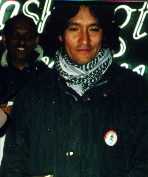
GE: First, it has obligated Bolivia to pass laws that have given many public assets to the transnational corporations. One of these laws greatly lowers the taxes on the large corporations. These taxes that were reduced from 51% to 18%. They were covered by the Bolivian people. This is reflected in the loss of jobs, in the loss of social services and the privatization of education.
JT: And the reaction of the people in Bolivia? Is there support for this project or resistance?...
GE: In Bolivia, there's a very limited resistance. I don't believe you can say there's a large-scale resistance because, lamentably, all the popular organizations have suffered a setback because of Neoliberalism and also because of leaders incapable of responding to this new challenge. They have taken positions that are very narrow and without vision. Thus, the resistance of the Bolivian people is very weak.
JT: And in other South American countries, are there alliances between popular movements?
GE: Yes, the idea is to form alliances. In Brazil, there was a huge march last month of landless people demanding to have more access to land. Above all, the idea is to search for new strategic alliances. In this moment, we have to understand that only together can we achieve something. If we continue alone, as countries, it is easier for the WTO to impose itself.
JT: For progressives in Bolivia, is the Cuban Revolution still a model to imitate? Or, are they looking for something new, perhaps more democratic? Or, are they divided on this?
GE: It's very complicated because, before anything else, the Cuban Revolution holds a very strong place in the history of Latin America and possibly the world. It has served as a symbol for all the aspirations of the Left.
Nevertheless, given everything that has happened in the world including the fall of the Berlin Wall, it raises a huge question: Is the Socialist model possible and has it responded to the necessities of the people? I believe it is a very strong debate because it questions democracy.
How can you ask about democracy in this country (the US) that is totally controlled? The press is totally controlled. There is a very sophisticated police force. The demands of the workers are never taken into account. Therefore, we can't talk of a great democracy that exists here in this country.
I believe that the Cuban Revolution is going to continue being a reference point for Bolivia, but that it should adopt itself to a new world. That is obvious.
JT: You participated in this caravan and traveled much of the United States. What have you learned about this society?
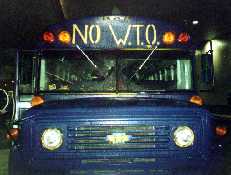
GE: I learned many things. First, I was impressed by the solidarity shown by the people in all the places we have been. Another thing is that we broke through the pattern we were accustomed to; one of seeing a wonderland. In reality, this country has problems like us. It is not a wonderland. It is a country where people struggle for their rights, which many times are totally discriminated against.
The other thing we have learned is that the people of the United States are not the enemy. The idea in many countries is that the US is the enemy. But, that's not so. It's the large corporations, the political system and the people who dominate all that.
I discovered many important things above all the idea that we can form a new movement of solidarity between the people of the US and Latin America. Once again, we are seeking to unite forces; needing each other without discrimination.
JT: Finally, what hopes do you have for this week here in Seattle?
GE: First, I'm not dreaming. I don't believe the 30th will change the world. There's no miracles in that sense. It seems to me that we should understand this: The struggle is very hard and it's for the long term. It's not worth it, in this small confrontation, to use up all our firepower. We need all our energies for this struggle. If we use up everything we have in one day, we are dead.
I hope we understand that this is just a demonstration. What's more important is that we begin to form strategic alliances that permit us to be united in this enormous struggle against the WTO.
Ibe: Kuna Youth Movement, Panama
The Kuna people live on a string of islands near Panama's Pacific Coast. Their lands are rich in minerals and biological diversity. And like land-based indigenous people al over the world, the Kunas are bearing the brunt of corporate globalization.
JT: Can you talk a little bit about your people's situation in Panama and how Neoliberalism is affecting them?

Ibe: Right now, we the Kunas have an autonomous territory. In spite of that, there's malnutrition, illiteracy, drug traffiking and alcoholism. Above all, there's corporations that want to explore for and exploit the natural resources of our people.
We the indigenous people of Panama and of all of Latin America, Africa and Asia are affected directly by the corporations. The corporations come to our communities and put on the mask of free trade, of globalization, of development. Before, they (the colonizers) arrived to baptize the Indians, to baptize the savages...
JT: Christianity and modernization work together...
Ibe: For us, it is the same. It is only a change of words. The objective is the same: to destroy and liquidate our races and to cut the communication between our people and the Mother Earth.
When the corporations arrive they pirate our historic knowledge, our indigenous knowledge, our medicine, our songs, our literature. They take them for their exclusive commercial usage. For us, our knowledge is not merchandise. It is a collective body. It is the communication between human beings and between communities. It is spiritual. Thus, the corporations arrive to break our historic roots. That's why we are against the corporations.
The corporations are the new pirates, the new mercenaries that want to liquidate us. Indians without Mother Earth are no longer Indians. That's why we indigenous people have to defend ourselves, our Mother Earth, our customs, our vision, our philosophy, our life.
JT: Why have you come here to the United States and participated in the caravan that traveled the whole country?
Ibe: We traveled from far away, coming from a small country, overcoming difficulties, overcoming languages, overcoming the food, overcoming the climate in order to tell the international community about the suffering, about the theft, about what is attacking our communities. That's why we made a long journey.
We shared that journey with other people from Africa, England, India, Pakistan, Israel, Germany, Bolivia, Venezuela and also the USA. We were from different cultures and different nations but we had only one objective: to destroy the WTO.
JT: What do you think of this week in Seattle?
Ibe: Everything we did this week was a total success. The presence of the people of North America and the North American youth was felt. On the first day (November 30) there was no meeting and that gave victory to the protesters. On the following days, delegates from other countries fought inside the meetings and there wasn't an accord. The African countries wouldn't sign an accord. The Caribbean countries wouldn't sign an accord. It was another victory in the struggle of the oppressed peoples. And, we have to continue this struggle more in the future.
Savahn Rosinbum: Nova High School Street Theatre Troupe, Seattle
The WTO was the talk of the town in Seattle months before the trade ministers (or the protesters) ever showed up. Savahn Rosinbum's high school civics class spent the first part of the semester studying up on the pros and cons of the WTO before reaching any conclusions. In the end, she says, they decided that the WTO was “undemocratic” and that “it's ruining the environment”.

Her class then brainstormed and created a skit (“The Globalization Game”) to perform in the streets. The skit was colorful and provocative with elaborate props. Demons, their faces painted red, raced around with giant dice enticing the unwitting to try their luck. It looked so irresistible. However, as the skit unfolded, there turned out to be hidden costs as well. Between performances, Savahn described how she and her classmates had become so involved in an issue that many adults consider obscure and unapproachable.
JT: Talk about what you and other students at Nova High School learned in your class about globalization this semester and why it's important to you.
SR: Well, we looked at both sides of the issue. We looked at some news clippings and articles in the newspaper. And, we read some Ralph Nader and Noam Chomsky.
Then, we prepared a teach-in at our school. We invited people from Seattle. We had four speakers, both pro-WTO and anti-WTO. We had a debate with the four of them. We tried to teach our school what was going on with...
JT: What conclusion did your class come to about the two sides of the debate?
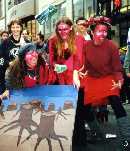
SR: Well, it was pretty easy for us to make a decision. We thought the WTO was something that really needs to be fixed.
It's not democratic. It's ruining the environment. It's taking jobs away. It's destroying human rights. It's taking away our right to make national and local laws. We found a few problems with it. And, we're just out here today to try and raise our voices the only way we can, which is protesting it since there aren't any citizen forums in the WTO.
JT: Tell me about how you all went from studying the WTO to putting together this action that you brought out into the streets today.
SR: Well, we studied about it (the WTO) and figured out what our major concerns were. And then, we tried to come up with a way to theatrically present those concerns to the public in a quick, short way that was also fun to watch and really interesting.
We came up with a fashion show demonstrating sweatshop fashions and then alternatives to those fashions. And, we also came up with this street theatre performance where they were asking the family to play the globalization game.

JT: Have you ever done anything like this before in the streets?
SR: I've never done street theatre before. I've been involved with a couple of small protests but nothing of this magnitude at all. It's really fun. We're competing with a hundred other people who are performing in the streets too. And, that's wonderful.
JT: Most young people these days are portrayed as being apathetic, disinterested, just want to get a job and get ahead. As somebody who has become active and aware, what does it take to strike that spark in young people to want something more than what they're told they are supposed to have?
SR: It doesn't take very much. All it takes is knowing what's going on. Once you know something is bad as a kid, you've got the energy to go out and do something about it.
I went to a regular high school and I would've never even heard about the WTO if I had continued going there. But, I switched high schools and I took a class on the WTO. In regular high schools, my brother goes to one, they haven't talked about it in class. And, it's this huge event going on in Seattle.
JT: What do you hope to see come out of this week of protests against the WTO? What kind of future are you looking for?
SR: At the very least, I would like to see massive transformation of the WTO. I want it totally democratically accountable and I want it to be promoting positive things like environmental and human rights protections. But actually, I'd like to see the start of a whole revolution. That's what I'm really hoping for, to have this thing going on in the streets all over the world.
LINKS:
Love and Rage in Seattle: The Day the WTO Stood Still
Independent Media Center
Susan George
United Steelworkers of America
Back to On the Road with John Tarleton